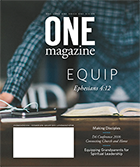
December 2018–
January 2019
Equip
(Ephesians 4:12)
------------------
|





How to Bring the Denomination to an End (In Seven Easy Steps)
By J. Matthew Pinson
An important disclaimer: the seven steps below are an exercise in satire. I certainly do not think we need to bring our denomination to an end. But I am convinced this is the way to do it. I am concerned we are tempted to be intimidated by the spirit of the age—to panic and thus do these things listed. We are all in this together, brothers and sisters, and we have to think and pray hard about how to overcome this temptation we all face, and which is shared with faithful Christians in other denominations.
We could write on the best ways to strengthen the denomination, to conserve our rich heritage of doctrine and practice, to worship faithfully, to foster growth in our churches, etc. But this article is about one thing and one thing only: the quickest way to bring the Free Will Baptist denomination to an end.
Step One: Get the Answers Wrong
Jump to conclusions about why people—especially young people—leave or don’t attend church. Then assume from those wrong conclusions why Free Will Baptists have a shortage of ministers or why some of our churches are dying. Assume the reasons young people are leaving Christianity and becoming Nones (those without religious preference or affiliation) are stylistic and cultural. Do everything possible to make preaching, teaching, worship, music, and youth ministry as much like secular pop culture as possible, since you are certain these “missing” features are why young people are leaving the church.
Rely on anecdotal data and miss out on all the credible research conducted by sociologists and scholars like Christian Smith, Melinda Lundquist Denton, Kenda Creasy Dean, etc., and studies by people like Thom Rainer (LifeWay), Ken Ham (Answers in Genesis), the Barna Group, and others. These studies all show that young people are leaving all sorts of churches of all cultural and stylistic types at the same rate—traditional to contemporary, rural to urban, liturgical to charismatic, small to megachurch. Misunderstand the actual reasons these researchers say young people are leaving the church: extreme segmenting of churches according to age, generation, and cultural preference; the resulting lack of intergenerational relationships and mentoring; shallow teaching from the pulpit and Sunday School; lack of depth, substance, and honest answers to tough intellectual questions, etc.
Fail to engage with studies like the Barna church architecture survey, which indicates two-thirds of Millennials prefer to worship in a traditional worship space and prefer the word classic to trendy when describing their church experience.
Continue to rely on the answers from the 1990s nondenominational megachurch movement that failed to produce lasting results in changed lives, growth in holiness, and a well-developed Christian worldview among evangelicals.
Step Two: Lose Your Nerve
Panic. Allow these mistaken assumptions about young people leaving church and the swift cultural changes in our secularizing society to throw you into a panic. In your panic, throw various cultural solutions at the problem of how to grow your church, hoping something will stick and work. Lose the courage of your convictions regarding the strong beliefs and practices your Free Will Baptist forefathers taught were biblical, theologically true, and important.
Step Three: Become a Wannabe
Long to be somebody else. Allow the fear and lack of courage in step two to create a profound lack of confidence in your identity as a Free Will Baptist. This lack of confidence will compel you to a wannabe mentality, in which you wannabe like others in evangelicalism that seem successful in the cultural subgroup you admire. Fill in the blank: non-denominational, megachurch,
Independent Baptist, Southern Baptist, young restless and Reformed, charismatic, quasi-charismatic, seeker-sensitive, liturgical, etc.

(And make sure the people you wannabe are Christian celebrities with large, successful churches.) Begin to imitate these individuals, ministries, and movements carefully, downplaying distinctive Free Will Baptist doctrine, practice, and tradition.
Step Four: Emphasize Style over Substance
In keeping with the above strategies, emphasize style over substance. Cling to the idea that tweaking and adapting to cultural preferences that appeal to a particular group of people is the silver bullet that will finally give us a church-growth breakthrough. Fail to understand that remaking church into a cultural experience (whether symphony hall, rock concert, or hoedown)—especially in our increasingly diverse neighborhoods—will further divide the Body of Christ. Thereby, you will create special interest groups that prefer generational or cultural preference rather than the gospel and the Word.
Strongly de-emphasize substance and doctrine, since doctrine divides. Be careful to avoid teaching doctrine in every area of church life. Make sure each sermon you preach, each Sunday School lesson you teach, and each song you sing has a minimal level of theological content. Especially downplay your Free Will Baptist doctrine, practice, and tradition. When you come to a passage that strongly teaches distinct Free Will Baptist doctrine or practice (the possibility of apostasy, the necessity of baptism by immersion for church membership, or the washing of the saints feet for example), you must choose between one of two options. Option one (preferred): preach and teach the passage in such a way that anyone in any audience could agree with it. Option two (while not preferable) will work almost as well: touch briefly on Free Will Baptist teaching and move on to the next point as quickly as possible. Never forget that preaching and teaching Free Will Baptist doctrine and practice will make people from other traditions uncomfortable and therefore discourage them from joining your church, thus cutting down your numbers and hampering church growth.
Step Five: Take the Short View
Never take the long view. Always emphasize short-term results. Use only methods that bring the quickest results, even when those methods have never been used in church history, and you have no inkling of unintended consequences. Don’t buy into the idea that long-term growth in the number of true disciples comes from church health, from building your church on the sufficiency of Scripture and the ordinary means of grace.
You resolutely don’t want to do this. It takes too long. You’re going to be retired in 30 years. You don’t have time. People will get bored (or leave) without quicker, bigger results. You don’t have the luxury of playing the long game. And you can’t guarantee how it will turn out. Instead, place a premium on instant results. Lean on the examples of celebrity pastors who have experienced amazing growth in their megachurches, and pattern your church after them.
Step Six: Emphasize the Attractional over the Missional
Engage in consumerism and segmented marketing. Attract people to the church like a marketer attracts customers to a product. Master the science of segmented marketing—according to generational and cultural tastes and preferences—rule number one for getting the customer to buy and sell more. Thus, do everything you can to divide the young from the old, since standard marketing research shows consumers will not buy things as readily if those items do not appeal to their generation, tastes, and preferences.
Never forget the customer is always right, and customers want to be entertained. Give each worship service the highest entertainment value possible. If you lose your edge, you will lose members to churches with bigger and better entertainment. Don’t fall for the approach that simply being a church with excellence in vibrant personal evangelism, disciplined prayer, expositional preaching, helping hurting people, and engaging in teaching, long-range discipleship and leadership development is the recipe for ultimate, healthy, long-term gospel growth. This sort of missional thinking is the death knell to successful attractional ministry, resulting in members transferring to other evangelical churches.
Step Seven: Develop Amnesia
Try really hard to forget, and perhaps this should be Step one. Regardless of the order, it’s the most essential step. Try really, really hard to forget. Carefully develop in yourself and those around you a systematic amnesia about the Christian tradition, the great cloud of witnesses, the saints and martyrs who have gone before you in the faith. This is especially true regarding the Free Will Baptist tradition. In every area of church life, emphasize discontinuity with the past.
Embrace a revolutionary model rooted in pop culture and demographic studies in one hand and a Bible in the other. Do not give in to the temptation to adopt a reformational model, retrieving forgotten Christian and Free Will Baptist faith and practices and thereby bringing fresh life to the church. Do not reach back to vibrant Christian reformation, evangelistic, and missions movements that emphasized the sufficiency of Scripture for the life and ministry of the church.
When you prepare for sermons, never read commentaries written before your lifetime. Instead, read catchy how-to books. Especially never read books from the Christian past about how to do church. Only read books on church and ministry by living authors. Never sing songs written before your lifetime. And, when it comes to doctrine, especially Free Will Baptist confessional heritage, read only blogs. Don’t read books about or by people who lived before you were born. In short,
initiate a clean break with the past in all your church practices.
Carefully cultivate amnesia. Live in and for the present. And never fall for the old line that only by conserving the riches of the heritage that has been bequeathed to us will we have anything to hand down for our future, to our children, and their children, and their children’s children.
So, let’s review the seven far-too-easy steps to bring the Free Will Baptist denomination to an end:
-
Get the answers wrong.
-
Lose your nerve.
-
Become a wannabe.
-
Emphasize style over substance
-
Take the short view.
-
Emphasize attractional over missional.
-
Develop amnesia.
About the Writer: J. Matthew Pinson is president of Welch College in Gallatin, Tennessee: www.welch.edu.
|
|

